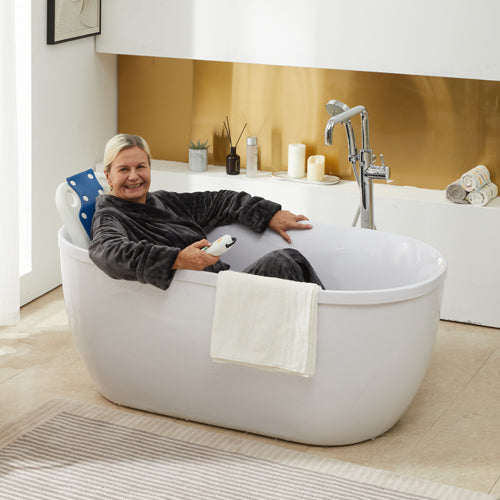Medicare generally pays to replace a mobility aid every five years if it's medically necessary. However, if your current mobility aid breaks down, becomes unsafe, or no longer meets your needs before then, you may be eligible to have it replaced sooner.
Below, learn about Medicare replacement coverage and how to reapply to replace your mobility aid to ensure you stay mobile and safe.
What Types of Mobility Aids Do Medicare Support Replacements For?
Medicare supports the replacement of various mobility aids if you need them and they are medically necessary and prescribed by your healthcare provider. Here are the types of mobility aids that Medicare covers for you:
-
Walkers: Medicare covers standard walkers, 2-wheel walkers, knee walkers, half walkers, and 4-wheel walkers, which can be replaced every five years or sooner if they become unsafe or inappropriate due to changes in your medical condition.
-
Wheelchairs: You are eligible for manual and power wheelchairs, with replacements provided based on periodic medical evaluations to confirm your continued need.
-
Scooters: Medicare covers mobility scooters if you are unable to use your wheelchair effectively at home. Replacements will be approved after a detailed assessment of your medical needs.
-
Canes and crutches: Medicare covers replacements for canes and crutches when they are prescribed by your healthcare provider due to changes in your mobility needs or to help recover from an injury.

How Often Will Medicare Pay for a Walker?
Medicare will cover 80% of the Medicare-approved amount for your mobility aid, but only if you meet your Part B deductible. In 2024, Medicare's deductible is set at $240, so you'll need to pay that amount out of pocket before Medicare steps in. Once the deductible is met, Medicare will pay 80%, leaving you with the remaining 20% of the cost.
To ensure Medicare covers your mobility aid, both your prescribing physician and your provider must accept the Medicare assignment. If either party doesn't, you may be responsible for the entire cost. Therefore, it's best to check with your physician and provider beforehand to avoid any surprise costs.
If you're enrolled in a Medicare Advantage plan, coverage terms may be different, and you'll need to check the details of your specific plan to understand exactly what you'll be responsible for.
What Does Medicare Cover for Rollator Walkers?
Medical Necessity
If a rollator walker is medically necessary for you, Medicare will reimburse you. It’s important to note that reimbursement requires a prescription from a doctor who states how important the mobility aid is to managing your mobility or preventing accidents at home due to your health condition.
Coverage Under Part B
Your rollator walker falls under the category of durable medical equipment (DME) and is covered by Medicare Part B. Therefore, you can get a device that is necessary to manage your health at home.
Cost Coverage
After you meet your annual Medicare Part B deductible, Medicare will cover 80% of the Medicare-approved amount for the purchase or rental of a mobility aid. You are responsible for the remaining 20% co-payment. However, the exact cost may vary depending on the price of the rolled walker and whether your provider agrees only to charge the Medicare-approved amount.
Supplier Requirements
You need to purchase your rollator walker from a provider that participates in your Medicare plan. Enrolled providers agree to accept assignments so that they adhere to Medicare-approved pricing, ensuring that you are not overcharged.
Additional Insurance
If you have supplemental insurance, such as a Medigap policy, it may cover your 20% copayment, reducing your out-of-pocket costs. Also, if you are enrolled in a Medicare Advantage plan, your coverage may be different and may offer additional benefits or different rules regarding copays and deductibles.
How Can I Get a Replacement Mobility Aid Through Medicare?
To get a mobility aid like a walker covered by Medicare, you can apply by following these steps:
-
Consult Your Doctor: If you notice that your current walker squeaks, has brake problems, or feels unstable, schedule an appointment with your doctor. Explain the issues you're experiencing so your doctor can determine if these issues warrant a medically necessary replacement.
-
Verify Medicare Coverage: Before you proceed, be sure to check with Medicare or a Medicare representative to confirm that the type of walker you need is covered, especially if you are looking for advanced features such as a walker with seats or an outdoor walker with larger wheels for outdoor use.
-
Choose a Medicare-Approved Supplier: Choose a vendor that not only accepts Medicare but also offers a wide variety of walkers. This is important if you need specific features that fit your lifestyle, such as a lightweight frame for easy transportation or enhanced mobility for indoor use.
-
Submit the Prescription: When you provide your vendor with a prescription, explain how you use your walker. For example, if you frequently walk on rough outdoor terrain, this information lets the vendor recommend a model that's sturdy enough to meet your needs.
-
Wait for Medicare Approval: While you're waiting for approval, stay in touch with the vendor to check if there are any updates or additional documentation needed. There may be processing delays if there's a backlog or Medicare requires a more detailed justification for the replacement.
-
Receive Your Walker: Once your replacement mobility aid arrives, test it thoroughly to make sure it meets your needs. Adjust the handle height, test the seat (if included), check the brakes, and make sure it provides stability and comfort. If you travel frequently or attend social events, try folding it to see if it will fit in your car or public transportation.

What If Repairs Are Needed Before Replacement?
If your rollator walker requires repairs before it qualifies for replacement, Medicare can help cover the cost if those repairs are deemed necessary. You should contact your provider for an evaluation to determine if a repair or replacement is more appropriate. Make sure these repairs are prescribed by your healthcare provider to qualify for Medicare coverage.
If the cost of the repair approaches the price of a new device, Medicare may choose to replace it. Therefore, keep all documentation of your interactions with your vendors and healthcare providers. After you meet your Part B deductible, Medicare will cover 80% of the cost of an approved repair, and you will be responsible for the remaining 20%.
FAQs
Will Medicare Pay for a Walker and a Wheelchair
Medicare can cover both a walker and a wheelchair if your doctor certifies that you need each for different mobility challenges. Typically, Medicare covers one mobility aid, but if both are medically necessary for you, you may qualify for coverage for both, as long as you submit the proper documentation through a Medicare-approved supplier.
Is a Prescription Needed Every Time for a New Walker?
Yes, you will need a prescription every time you purchase a new mobility aid through Medicare. Your doctor will need to evaluate your condition and determine if you have a medical need for a new mobility aid. This prescription is required for Medicare to cover the cost, and you will also need to purchase the mobility aid from a Medicare-approved provider. So, seeing your doctor regularly can help you know when it’s time to change.
How Much Does Medicare Pay for a Walker with a Seat?
Medicare will cover 80% of the Medicare-approved amount for a walker with a seat, once you've met your Part B deductible. You'll be responsible for the remaining 20% as your co-payment. To qualify, your doctor needs to determine that a walker with a seat is medically necessary for your condition, and you’ll need to get it from a Medicare-approved supplier to ensure coverage.







